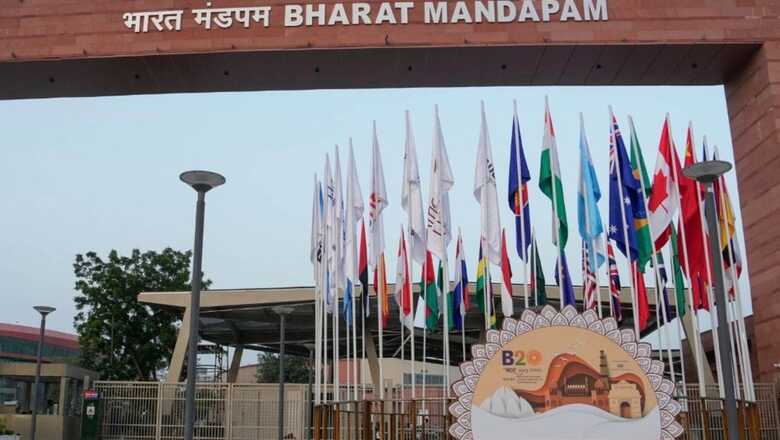
views
As India hosts the G20 Summit in New Delhi on September 9-10, the list of attendees as well as absentees has been attracting equal attention. Those who will be attending the summit include US President Joe Biden, French President Emmanuel Macron, UK Prime Minister Rishi Sunak, Canadian Prime Minister Justin Trudeau and Australian Prime Minister Anthony Albanese.
Two prominent absentees in this summit are Chinese President Xi Jinping and Russian President Vladimir Putin. China will be represented by its Prime Minister Li Qiang while Russia will be represented by its Foreign Minister Sergey Lavrov.
This is the third consecutive summit that Putin will not attend. Earlier, Putin had remained absent from the 2021 summit in Rome, Italy and the 2022 summit in Bali, Indonesia. Xi Jinping attended the 2022 summit but is slated to skip the 2023 summit in India.
Despite being a platform for economic cooperation, the G20 is finding it difficult to separate geopolitics from economics. The G20 was formed in 1999 as an economic forum to address the worldwide financial crisis. What started as a meeting between finance ministers and governors of Central banks has now expanded its scope in 2007 that involve participation from Heads of State and Heads of Government.
China’s rising belligerence in the past few years and the Russia-Ukraine War since the last one and a half years have been dominating the past few G20 meetings. At the time of its formation, the G20 reflected the contemporary world order, post-disintegration of the Soviet Union. Following the disintegration, the world had increasingly turned to globalisation with economic interests and interdependence overtaking the bi-polar security-driven world order that characterised the Cold War era. However, security considerations are again finding consonance in the economic forums as well. China’s economic and strategic assertion has been at the forefront of disrupting the democratic rules-based order and attempting to create a China-centric order.
For its part, India has been a principal proponent of multilateral order within as well as outside of the G20. India envisions an order where the interests of all, particularly the countries of the Global South, are protected. While assuming the presidency of the G20, India had stated that its focus would be on the Global South. Concomitant to its stand on the Global South, India has also been advocating reformed multilateralism, implying that institutions like the United Nations (UN) need to be reformed to address the challenges that developing countries face. Further, the developing countries must also have equal representation and say in the functioning of the UN.
India promotes a vision which calls for reforms to accommodate the developing countries. However, the Indian perspective is not necessarily the one that supports disruption or creates a binary order. China thinks otherwise. While advocating the case of developing countries, China’s policy is to project these countries as being discriminated against by global financial institutions such as the World Bank and the International Monetary Fund (IMF). By promoting its Belt and Road Initiative (BRI) project, China is attempting to lure the less developed countries away from the West.
China may be deriving confidence from the recent expansion of the BRICS. In the recently concluded BRICS Summit in South Africa in August, the grouping added six new members – Argentina, Egypt, Ethiopia, Iran, Saudi Arabia and the UAE. All these new members enjoy close ties with China. The expansion of BRICS is even touted as a counter to the perceived hegemony of the West in general and the G7 countries in particular. However, it is pertinent to note that as much as the new BRICS members enjoy close ties with China, most of them —with the exception of Iran — also have the US as their major trading partner.
While China may be harbouring illusions about creating an alternate order, it is unlikely to succeed. The developing countries would not favour China’s binary approach to create a divide between the West and the developing countries since the latter does have economic stakes in the former.
The G20 is reflective of India’s commitment towards the Global South. Out of the total 28 members and guest countries of the G20, 14 countries — Argentina, Bangladesh, Brazil, China, Egypt, India, Indonesia, Mauritius, Nigeria, Oman, Saudi Arabia, Singapore, South Africa and UAE — are part of the Global South. It implies that 50 per cent of the G20 members and guests belong to the Global South.
Xi Jinping’s absence is unlikely to have any adverse effect on the G20 Summit. His absence is a reflection of China’s confrontationist approach and not of India’s credibility. Apart from projecting the BRICS as a counter to the West, China’s recent assertion through cartographic aggression would have had a polarising impact anyway on the functioning of the G20. Its members like India, the US, Australia, Japan, France and the UK view China as a major competitor and even an adversary.
While most of the members of the G20 converge on economic cooperation, China’s growing economic and strategic aggression could cause a reshaping of the G20. It would function smoothly and successfully with India working with like-minded countries.
The author is a political analyst and researcher based in Vadodara. His areas of specialisation include international relations, foreign policy and geopolitics. He tweets @NiranjanMarjani. Views expressed in the above piece are personal and solely that of the author. They do not necessarily reflect News18’s views.




















Comments
0 comment